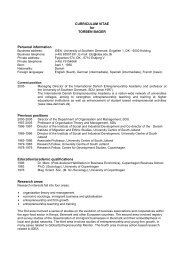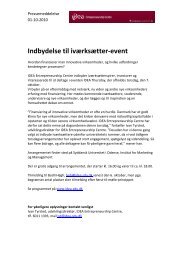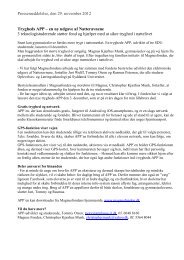Education, Training and Networking for Entrepreneurship in ...
Education, Training and Networking for Entrepreneurship in ...
Education, Training and Networking for Entrepreneurship in ...
Create successful ePaper yourself
Turn your PDF publications into a flip-book with our unique Google optimized e-Paper software.
an arrow represents the magnitude of the effect.<br />
How these cultural conditions, jo<strong>in</strong>tly with opportunities,<br />
shape entrepreneurship will be exam<strong>in</strong>ed<br />
next.<br />
Effects upon entrepreneurship from cultural<br />
<strong>and</strong> <strong>in</strong>stitutional conditions<br />
The cultural conditions <strong>and</strong> the opportunities <strong>in</strong><br />
a society are a framework <strong>for</strong> entrepreneurship<br />
<strong>in</strong> the society, <strong>and</strong> their effects upon entrepreneurial<br />
activity can be estimated. The level of<br />
entrepreneurial activity <strong>in</strong> a society is here<br />
measured by the TEA-<strong>in</strong>dex, the rate of earlyphase<br />
entrepreneurs <strong>in</strong> the population, as was<br />
exam<strong>in</strong>ed <strong>in</strong> Chapter 3.<br />
First, the association of each condition with entrepreneurial<br />
activity is <strong>in</strong>dicated by their correlation,<br />
Table 5.6. Each condition has a correlation<br />
with entrepreneurial activity that is positive.<br />
<strong>Entrepreneurship</strong> is even higher correlated<br />
with a comb<strong>in</strong>ation of the five conditions (the<br />
multiple correlation is higher than any of the<br />
five).<br />
Table 5.6<br />
Correlation of national entrepreneurial<br />
activity (TEA) with opportunities <strong>and</strong><br />
each cultural condition<br />
Developed societies (N=39)<br />
Opportunities 0.4<br />
Individualism 0.4<br />
Esteem 0.2<br />
<strong>Education</strong> 0.2<br />
Skills 0.3<br />
Multiple correlation with all five 0.5<br />
The effect upon entrepreneurship from each<br />
condition, while hold<strong>in</strong>g the other conditions<br />
constant, is estimated by a regression (statistical<br />
details are <strong>in</strong> Table 5.7 <strong>in</strong> the Appendix).<br />
Opportunities have a huge effect upon entrepreneurial<br />
activity. A society that provides<br />
abundant opportunities will also typically have<br />
a high level of entrepreneurial activity, whereas<br />
a society with few opportunities will have little<br />
entrepreneurial activity. Skills also appear to<br />
promote entrepreneurship, but the separate effect<br />
is much smaller than the effect of opportunities.<br />
Individualism, education <strong>and</strong> esteem<br />
have no discernible separate effects on entrepreneurial<br />
activity. One fourth of the variance<br />
among the developed countries <strong>in</strong> their entrepreneurship<br />
is accounted <strong>for</strong> by just these two<br />
conditions, opportunities <strong>and</strong> skills. Their effects<br />
are shown <strong>in</strong> Figure 5.3.<br />
Cultural conditions promote entrepreneurship<br />
through several sequences of positive effects.<br />
The cultural value attached to <strong>in</strong>dividualism directly<br />
promotes all the other three cultural conditions:<br />
esteem of the entrepreneurial vocation,<br />
the education <strong>in</strong> entrepreneurship <strong>and</strong> the entrepreneurial<br />
skillfulness of the population. <strong>Education</strong><br />
promotes skills, so there is an <strong>in</strong>direct<br />
effect of education upon entrepreneurship <strong>in</strong><br />
the manner that education promotes skills<br />
which <strong>in</strong> turn promote entrepreneurship. More<br />
fundamentally, although <strong>in</strong>dividualism does<br />
not directly affect entrepreneurship, it has two<br />
<strong>in</strong>direct effects. One <strong>in</strong>direct effect works <strong>in</strong> the<br />
way that <strong>in</strong>dividualism promotes skills which <strong>in</strong><br />
turn promote entrepreneurship. Another <strong>in</strong>direct<br />
effect is that <strong>in</strong>dividualism promotes education<br />
which <strong>in</strong> turn promotes skills that promote<br />
entrepreneurship. Both <strong>in</strong>direct effects<br />
are positive, so <strong>in</strong>dividualism has a positive effect<br />
upon entrepreneurship. Moreover, the effects<br />
of <strong>in</strong>dividualism on education <strong>and</strong> skills<br />
are huge, so the effect of <strong>in</strong>dividualism on entrepreneurship<br />
is big.<br />
The effect of the framework upon entrepreneurship<br />
can be graphed by plott<strong>in</strong>g the countries<br />
accord<strong>in</strong>g to their entrepreneurship <strong>and</strong> to the<br />
optimal comb<strong>in</strong>ation of framework conditions,<br />
Figure 5.4, <strong>in</strong> which an asterix marks a country.<br />
The association between the framework<br />
conditions <strong>and</strong> the level of entrepreneurship is<br />
obvious; a country with an extensive framework<br />
will also typically have a high level of entrepreneurship,<br />
whereas a society with a meag-<br />
40















